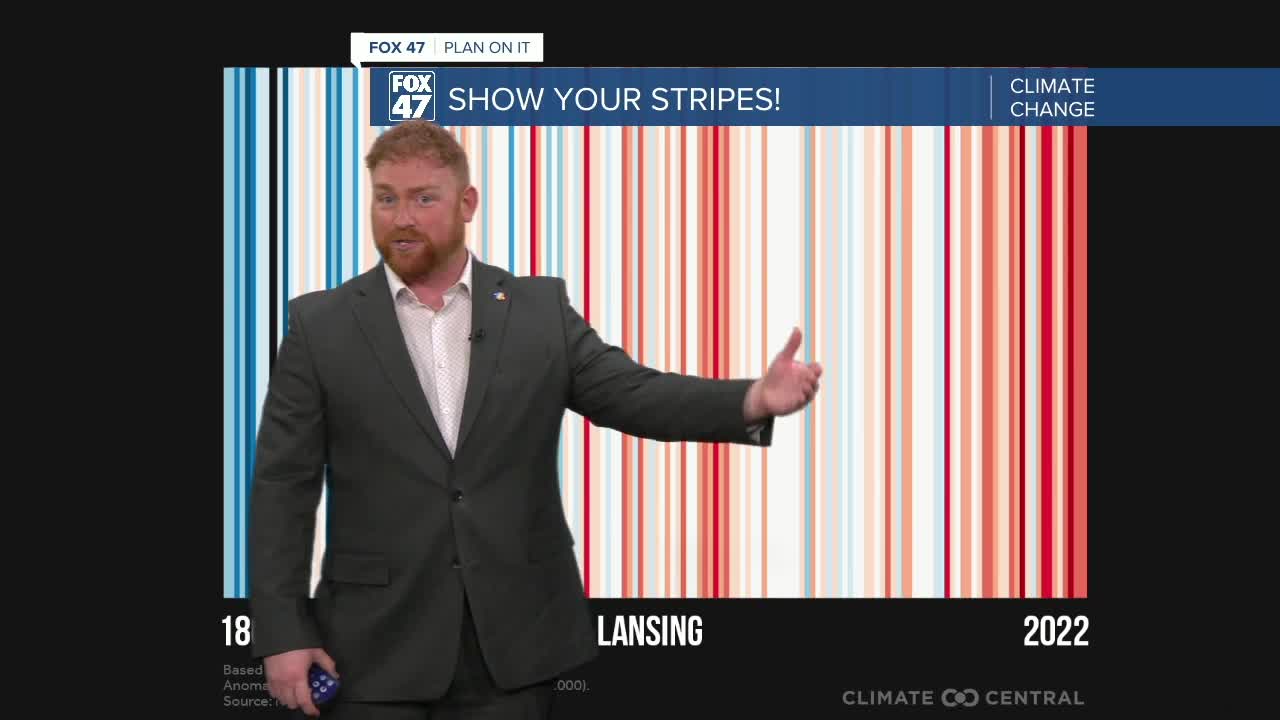LANSING, Mich. — Climate change is a global crisis that is also showing effects here in Michigan. As carbon is continually pumped into the atmosphere, the weather and climate will continue to change in our neighborhoods.
Not only is it the first day of summer, but it's what us meteorologists and climate scientists around the world call “Show Your Stripes Day.” The goal is to bring awareness to climate change and how it impacts us here in our neighborhoods, not just globally.
We will present you the “Show Your Stripes” images, which visually show how things are changing and warming over time even on a local level.
Each stripe that you're about to see is the average temperature over the course of one year. Anything on the red side means warmer than normal, and anything on the blue side means colder than normal.
In 2022, the planet was 1.1 degrees Celsius warmer than the baseline, which is established as 1881-1910.
It’s important to note that 2022 was a La Niña year, the third one in a row, which keeps the global temperatures cooler.
Now, as we slingshot into an El Niño pattern, we might hit the crucial point of 1.5 degrees Celsius above normal. This level is feared among scientists as a point at which runaway warming might begin to take place.
So, here is the famous image that you're going to see. The image below is the global temperature starting in the 1800s. Earlier on, a little bit of below average global temperatures can be seen. Of course, as the climate changes, it really started to accelerate, and continues to accelerate, that warming. We've had some of the warmest years on record just in the last decade or two.

So, let's get a little more localized, right? We need to know how this affects us here at home. The image below is the United States' temperatures. There’s an obvious warming trend as well going from the 1800s into the 2020s.

Now, to the state of Michigan. We also go all the way back to the late 1800s. Sure, we had a couple of warm years during the dust bowl, but notice, as a whole, things definitely got warmer. We've had some big ups and downs, but that's also indicative of climate change across the planet.

Now, to Lansing and Jackson specifically. Notice when we look way back in the mid-1800s, temperatures were cooler. Then, just like everyone else, we got warmer - way warmer. There was a little bit of a lull in the 1970s, which a lot of folks might remember. That decade typically had more snow and colder temperatures. The warming has really accelerated over the last several years.

From the 1800s to 2022, Lansing now averages more than three degrees warmer per year, and also received on average three inches more precipitation per year.
Here is how this impacts us here in Michigan. This can be found on the state of Michigan’s website. The Great Lakes can have more harmful algae blooms, especially down in Lake Erie where water quality will suffer. Shipping seasons will technically get longer. However, with more severe weather possible, it might impact shipping a little bit as well.
Of course, animal migrations will happen sooner and later when we have a warming climate. There will also be a longer growing season. While that seems like a good thing, heat-wave damage and violent temperature swings can wreak havoc on yields. We saw that in 2012 when we had record warm in March followed by cold in April. It killed the apple crop. Severe droughts and floods will also impact agriculture.
In addition to heat days, winter recreation will suffer with shorter and warmer winters. That means less skiing, snowboarding, snowmobiling, ice fishing, things like that, and therefore, economic harm. However, warmer Great Lakes water temps can increase lake-effect snow temporarily, especially with more severe cold outbreaks. That's why I put an asterisk there because snow from the storm systems will likely decrease in some areas. We'll see less lake-effect snow overall eventually as well.
The composition of species of trees and plants that make up our forests can change as well. We're talking about whole ecosystems. We can have certain breeds of trees die out or certain breeds and species of trees become more prevalent in areas they weren't before because of a changing climate.
For warm-water fish, it's good news for them. Obviously, cold-water fish, not great news there. Erosion and flooding also impact fish habitats. More pollutants and sewage and things like that from flooding going out into the Great Lakes for example.
Now, onto air pollution and air-quality concerns. We're familiar with that lately, right? It’s not just wildfires, air quality from ozone down at the surface can affect folks as well. A warmer climate has more of that.
So far in 2023, we are very accustomed to air-quality concerns from wildfire smoke, ozone due to excessive heat and warmer temperatures in general with quick, severe, cold snaps mixed in.
It's happening. It's “here,” and “Show Your Stripes Day” is to bring awareness to it.
Want to see more local news? Visit the FOX47News Website.
For more news in your neighborhood, go to our In Your Neighborhood page on our website.
Stay in touch with us anytime, anywhere.
Sign up for newsletters emailed to your inbox.
Select from these options: Neighborhood News, Breaking News, Severe Weather, School Closings, Daily Headlines, and Daily Forecasts.



